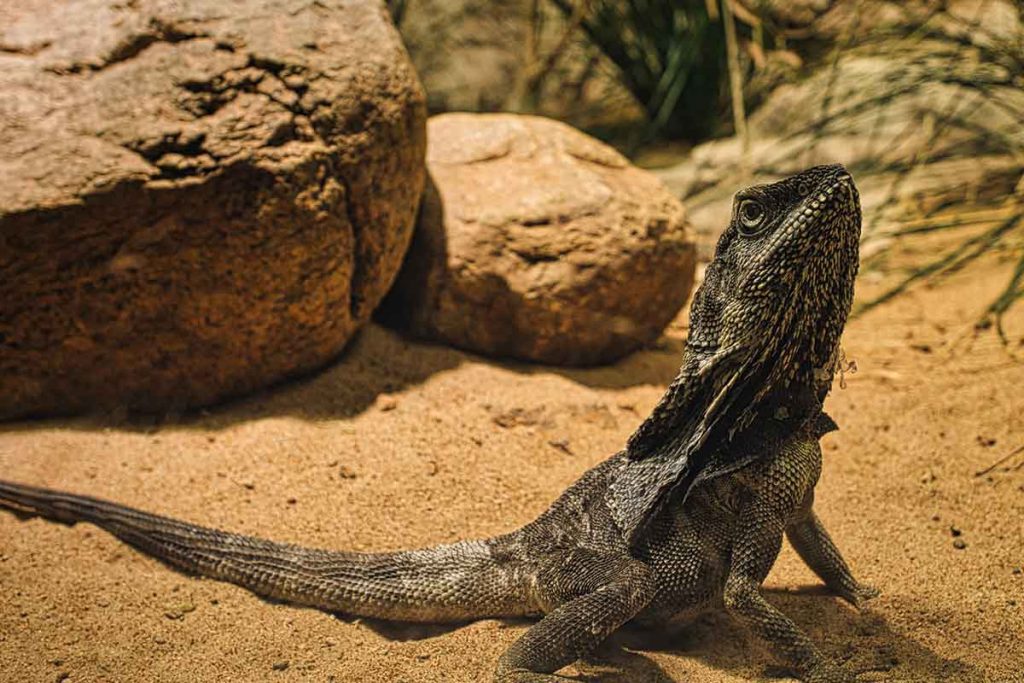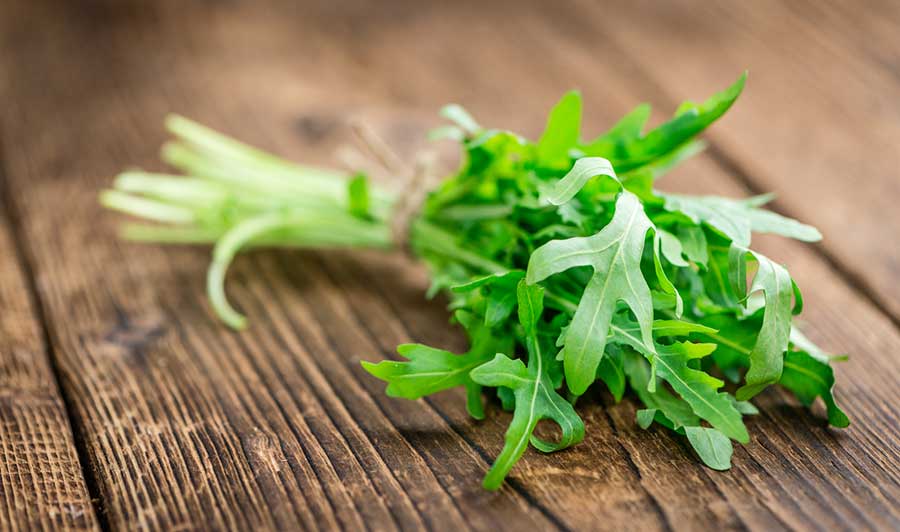Bearded dragons love variety in their food. It is important to offer them plenty of taste, textural, and nutritional variety to keep them interested in eating as well as healthy. Browsing through the grocery store may have prompted you to ask: can bearded dragons eat arugula?
You will be pleased to know that, yes, bearded dragons can have arugula!
Arugula is a cruciferous vegetable that packs a nutrient punch in the best way. It is high in
Arugula, also known as rocket, is a medium-to-dark leafy green that has a peppery taste with soft, young leaves. This peppery taste is a favorite of many bearded dragons because it is similar to but also different enough from mustard greens that it provides variety and promotes enrichment.
Read on to find out how to prepare arugula for your bearded dragon, its detailed nutritional information, why it benefits bearded dragons, and what you could feed your bearded dragon as an alternative to arugula.
Preparing Arugula for Your Bearded Dragon
As we touched on above, arugula is perfectly safe and healthy for your bearded dragon to eat. Arugula is an excellent staple green to form the basis of your bearded dragon’s daily salads. This is because it has enough
However, not all arugula is equal. In particular, baby arugula is best for bearded dragons. This is because the leaves are softer, fresher, and more flavorful, and the fiber in them is not tough. However, fully grown arugula is no problem in a pinch.
When preparing this green for your beardie to eat, it is always important to cut the arugula down to the correct size. The pieces should not be larger than the space between your bearded dragon’s eyes. This is especially important for the older and tougher arugula leaves.
Additionally, make sure you wash the arugula leaves. Insecticides, pesticides, herbicides, and waxes that coat fresh vegetables (even if they are organic) are incredibly harmful to bearded dragons and will make them sick.
Once you have washed the leaves, remove any of the large, tough stems that will be difficult for your bearded dragon to chew through. This is especially true of the older leaves. The younger leaves have not yet developed the large tough stems.
After you have prepared the arugula leaves, put them on your bearded dragon’s food dish and give them a light misting of water. Bearded dragons often do not recognize standing water at all and can become dehydrated without getting enough water with their food. This is an excellent way to give your scaly friend a hydration boost!
Why Is Arugula Good for Bearded Dragons?
Arugula makes a great staple green because it is packed with nutrients. In fact, it is so healthy that you can even purchase it in powdered form to help boost your nutrition levels as a human!
Below, let’s take a look at arugula’s nutritional content and why this cruciferous veggie’s many vitamins and nutrients are so beneficial to your bearded dragon.
Vitamins
Arugula is vitamin dense. This is very important, as bearded dragons need a wide range of vitamins just like humans do. Different vitamins perform different functions in the body.
For starters, vitamin K helps with the absorption and processing of
Arugula is also packed with vitamins A and C. These vitamins support eye health as well as the immune system. Bearded dragons are at risk of developing illness from certain kinds of bacteria that can be found in their food, in their enclosure, from cross-contamination, and from handling, so a strong immune system is vital.
Calcium
As mentioned before, good bone health is essential for bearded dragons. If bearded dragons do not get enough
This is an incredibly painful and often irreversible illness that can be avoided if the proper diet is provided to your bearded dragon.
Arugula is one of the best greens that you can offer your bearded dragon because it is high in
Offering your beardie lots of foods with the proper
To ensure your bearded dragon is able to absorb enough
Water
Water is obviously an essential component of any animal’s diet. Unfortunately, bearded dragons do not always recognize standing water as water at all. This means they can dehydrate to the point of illness and death if they do not get enough hydration in their diet even if there is a water dish in their enclosure!
Therefore, providing your bearded dragon with water-rich foods is essential to boosting and maintaining their hydration.
Luckily, for every half cup of arugula, there is roughly 9.17g of water. This means incorporating arugula as a staple green in your bearded dragon’s diet will ensure they get enough water to avoid becoming dehydrated.
As mentioned previously, you can also mist the arugula before giving it to your bearded dragon to boost their hydration even more.
Fiber
Dietary fiber is essential for reptiles. Fiber is like a broom, and it sweeps the digestive system clear of all old food so nothing is left behind to start rotting or turn septic.
Fiber also helps with regulating other factors in your bearded dragon’s body like maintaining a healthy microbiome in the gut by regulating the good and bad bacteria.
Additionally, fiber helps your bearded dragon’s digestive system break down the exoskeletons of the insects they eat. Older bearded dragons in particular sometimes have a problem breaking down these exoskeletons, so consuming foods with plenty of fiber helps prevent impaction.
Healthy Foods to Pair with Arugula
Bearded dragons cannot only eat leafy greens. While arugula is nutrient dense and contains good amounts of fiber,
Apart from the fact that your bearded dragon needs a variety of nutrients in their food, they also need different colors, textures, and tastes to keep them interested in what they are eating. Imagine just eating arugula for the rest of your life! It would not be fair or kind to do the same to your bearded dragon.
Include other greens and vegetables such as:
- Collard greens
- Beet tops
- Carrots
- Sweet potatoes
- Bell peppers
- Zucchini blossoms
- Pumpkin
- Escarole
- Endive
Bearded dragons also need protein in their diets. Young bearded dragons should have 70% of their diet made up of insect protein, while adult bearded dragons’ diets should be around 20% insect protein. Protein is essential to build and maintain muscles, organs, and the immune system, so younger beardies need a bit more of it than fully-grown adults do.
Healthy sources of insect protein include:
- Hornworms
- Crickets
- Dubia roaches
- Phoenix worms
- Earthworms
- Nightcrawlers (large earthworms that will need to be chopped up into smaller pieces)
Other Great Greens for Bearded Dragons
Greens should form the bulk of your bearded dragon’s daily salad. This is because they are all generally high in
So, what are some other tasty greens you can give your bearded dragon instead of arugula that are still just as healthy and nutrient-dense?
Various greens are excellent substitutes for arugula. However, they are not all equal in terms of
Some excellent greens to offer your bearded dragon instead of arugula include:
At the Tail End of Things…
Bearded dragons can eat arugula. In fact, it is so healthy that it can be a staple green and form the backbone of their daily salad! Arugula has excellent
Arugula is good for bearded dragons because it is high in dietary fiber as well as water, which maintains good gut health and helps with hydration. It is also jam-packed with other nutrients such as vitamins K, A, and C, which help boost the immune system and maintain good bone health.
For a more detailed look at what else you can feed your bearded dragon, have a look at our guides on what worms are best, the best insects, the best greens, the best fruits, and the best vegetables for bearded dragons.




